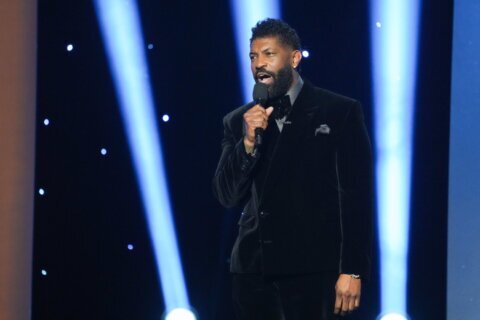WASHINGTON — Martin Luther King Jr. Day is more than just a federal holiday or a day of service: It’s an annual reminder of the way that peaceful protest can change the world.
“He was organizing protests at the time of his assassination,” actor Danny Glover said. “The last we knew of Martin was that he was in support of sanitation workers down in Memphis, Tennessee, in 1968. … He was also in the midst of organizing a Poor People’s March, not just a civil rights march, but for all poor people — black, Asian, brown, white, Native American.”
This month, Glover is throwing his support behind the new grass-roots documentary “The Power of Protest” by filmmaker Micah Fink. As an official adviser to the film, Glover will add celebrity clout after such classics as “The Color Purple,” “Lethal Weapon” and “The Royal Tenenbaums” and current achievements like his NAACP Image Award on Monday night.
“Glover has been an activist since his high school days,” Fink said. “He was very involved in the civil rights movement from his earliest days and has continued through his whole life to be an outspoken advocate for social justice and political change. … I think he felt a real resonance with what we’re trying to accomplish, which is to bring the conversation … into the present, to see that these issues are very much alive today. … The power of protest is profound.”
Which modern-day protest movements will the documentary explore?
“The vision for the film is to focus on four or five different protest movements,” Fink said. “One is Lancaster Against Pipelines in Lancaster, Pennsylvania, who have organized against a frack gas pipeline being rammed through their community. … The environmental movement today is starting to take a stand against pipelines, frack gas, and a culture that seems to be bent on extraction at the price of destroying the environment and causing climate change.”
In addition to environmental protests, the film will also look at race relations.
“I think Black Lives Matter is certainly a critical story that really continues the legacy of Martin Luther King’s movement,” Fink said. “This idea of police violence and mass incarceration and how that impacts the black community is potentially profound.”
While racial equality is one powerful slice, gender equality is another.
“The Women’s March last year after the inauguration was one of the largest, if not largest, mass protests in American history,” Fink said. “The energy that exists to support resistance is widespread. … I think, potentially, the #MeToo movement [will also be in the film]. We’re already seeing it take root [and] develop real political and legislative strength. As members of #MeToo start to organize and fund lawsuits, I expect you’ll see a real political moment arise.”
While many of these issues are progressive, Fink also wants to study conservative protests.
“I’d like to look at the Tea Party in terms of successful community organizing that not only had mass protests, but were also able to rise into a very, very effective legislative agenda that has really transformed the character of the government in Washington,” Fink said. “I think it’s useful to look at examples from both political sides to see what’s really effective today.”
By intercutting all of these various protest movements, the film will answer key questions.
“A lot of people say, ‘These marches are great, but what do they really accomplish?'” Fink said. “Is it enough just to show up? Or, do you need to have a grand strategy? Do you need to have objectives? How do groups that exist around the country, how are they shaping and forming those objectives? And, which are the ones that ultimately end up to be the most successful?”
Glover insists that the idealistic words of protests must be matched by tangible actions.
“Protest is one thing, but at the same time, we have to imagine: What do you want in the process? What do you want the change to look like?” Glover said. “Dr. King would say, yes, it’s important that we protest in every way we can, but the most important thing is we have to envision the type of community and relationship that we want to come out of the process.”
In addition to King, producer Josh Grossberg said the documentary is also inspired by Howard Zinn, the late historian and author of “A People’s History of the United States” (1980).
“Howard knew Martin Luther King and would believe as King would believe: that it’s a long struggle, and we have this extraordinary capacity as human beings to imagine something better, fight for something better and commit ourselves to something better,” Glover said.
In many ways, King couldn’t have even imagined the ripple effect of his movement.
“He couldn’t talk about climate change at his point in time; he couldn’t talk about LGBT issues; he couldn’t talk about all of these issues. But now, we can,” Glover said. “Certainly, King would revel in the expansiveness of the movement. … And in doing it, we make a greater union.”
No matter how much the movement expands, the same techniques remain effective.
“Nonviolent protest is the most powerful political tool at anybody’s disposal,” Fink said. “What King did in the ’60s was create strategies of nonviolent protests that flourished [with] people out in the streets, but really, there was a deep organizing principle behind it. … He was a master strategist. The events in Birmingham [were] preplanned. They called it operation ‘C’ for confrontation, going into the streets to elicit a response to help Americans understand.”
In the end, Glover believes change happens from the bottom up, not from the top down.
“‘Power is never conceded except on demand.’ Frederick Douglass. We have to demand it.”
Click here for the film’s Kickstarter campaign. Listen to Danny Glover and Micah Fink below:







